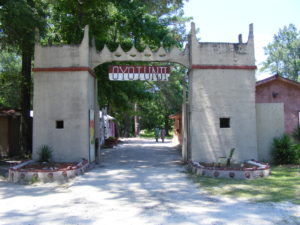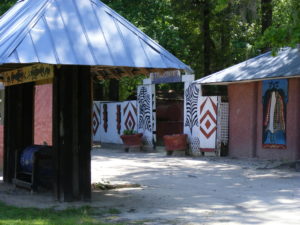Mecca
North America’s Oldest Authentic African Village
The Kingdom of Oyotunji African Village
The Oyotunji Village was founded in Sheldon, South Carolina in 1970 and it is still running today. According to the village’s website, the slogan is “The Freedom You Can Feel.” The mission of this group is “to remain a crucible for the study of African culture, and we want to research and restore our culture.” The residents are interested in preserving African heritage, and they are particularly focused on the Yoruba and Dahomey cultures, which are traditionally from West Africa. The Oyotunji Village is very interested in sharing their culture with people, and they offer tours, provide educational opportunities, and host festivals that outsiders are welcome to.


A noteworthy member was Ofuntola Oseijeman Adelabu Adefunmi and he was the founder and first king, or “oba,” of the Oyotunji Village. The original leader was inspired during a trip to Cuba and was initiated into orisha priesthood. Further influenced by Black nationalism in the 1960s, he had a vision of creating a place for African Americans to get back in touch with their roots, and the Kingdom of Oyotunji was created in 1970. Oba Adefunmi was known for his desire to educate people and to create buildings and monuments that resemble ones found in the homeland. The original leader was inspired during a trip to Cuba and was initiated into orisha priesthood. Further influenced by Black nationalism in the 1960s, he had a vision of creating a place for African Americans to get back in touch with their roots, and the Kingdom of Oyotunji was created in 1970. Initially the village had over 200 people but there are just 10 families remaining today.
This community resembles other communes we’ve read about in that they had a desire to go back-to-the-land and wanted to preserve old values. In addition, they want to get away from mainstream society. This particular commune is noteworthy because its residents are Black and their goal is to highlight their history and culture rather than get away from it. The village makes attempts to maintain tradition and culture, and this includes wearing traditional African clothing. The group also moved outside of tradition in some ways. For example, the current king does not recognize animal sacrifice or polygamy. Unlike some of the other commune groups we have studied, the Oyotunji Village uses electricity and indoor plumbing.
I think the decrease in numbers is probably similar to what happened to other communes and intentional communities. Ultimately, the vision looked really nice but the execution is much harder when you have a mix of people. In this group’s case, I think it was a wonderful idea to want to get in touch with one’s African ancestry. However, I think it would be difficult to immerse oneself and not have direct connections, such as one’s grandmother, to teach the history. I think what made this group last is that they are focused on living simply and are united by a common history and traditions.
Sources
“Oba Oseijeman Bio.” Oyotunji, www.oyotunji.org/oba-oseijeman-bio.html.
“Oyotunji.” Oyotunji, www.oyotunji.org/.
SouthCarolinaETV. “Oyotunji African Village.” YouTube, YouTube, 10 Aug. 2012, www.youtube.com/watch?v=Dbb4SeX6f-g.